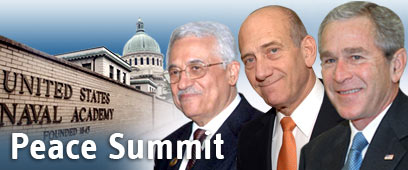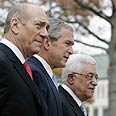

“The international circumstances that were created, specifically at this time, allow you and us to take a courageous step, which involves the need to make painful compromises and forgo those dreams which were part of our national ethos for so many years, and to open a new chapter offering hope for a better life for all of us.”
(Prime Minster Ehud Olmert, speaking at the official memorial ceremony for David Ben-Gurion, November 27, 2006.)
Exactly one year has passed, and we were treated to similar words at Annapolis. But perhaps that is the nature of the problem. At the moment, and in all other moments that have culminated in this one, words have comprised the backbone of the somewhat spineless Israeli-Palestinian process. Now that the Annapolis meeting is over, the time has come for our leaders to talk less and do more.
I have always been a strong proponent of dialogue as a means of solving any dispute. And it is certainly true that it has taken our various leaderships seven years of military operations and unilateralism to finally realize that the only viable way to achieve a thriving Israeli state is through negotiations on an agreement that satisfies both parties to the conflict.
Luckily for all stakeholders involved, the wheel did not need to be re-invented in Annapolis. The parameters outlined in previous negotiations form a firm foundation for any agreement. For example, the issue currently in the headlines - the Jewish character of the State of Israel - has already been settled in the Geneva Initiative: in a joint Israeli-Palestinian Accord it was agreed that the "parties recognize Palestine and Israel as the homelands of their respective peoples," and that the agreement "marks the recognition of the right of the Jewish people to statehood."
We need to believe peace is possible
In contrast to previous milestones, the post-Annapolis period must mark a milestone where words, speeches, and declarations are leveraged into a sustainable, pragmatic process.
With the help of the United States, the International community, and the moderate Arab world, our leaders are currently faced with an exquisite opportunity to lead the Israeli public into a new era: An era in which Israel will live in peace alongside Palestine; An era in which a growing part of the state budget is allocated to education, health, welfare, infrastructure, industry and the development of the Negev and the Galilee; An era in which 22 Arab Embassies will be established in western Jerusalem; A time where compulsory military service will be shortened and Israel’s borders and capital will finally be recognized by the international community.
What we, the Israeli public, need to do is believe that peace with our neighbors is possible and demand that our leaders be brave enough to make the necessary concessions to obtain it.
After all, if on November 27th 2006, you were told that on November 27th 2007 Prime Minister Olmert would be at a peace conference in Annapolis with President Bush, President Abbas, and senior Arab world representatives, including Syria – would you have believed it?
Michal Radoshitzky is the Director of Foreign Relations at Geneva Initiative and an M.A. Student at the University of Tel Aviv















